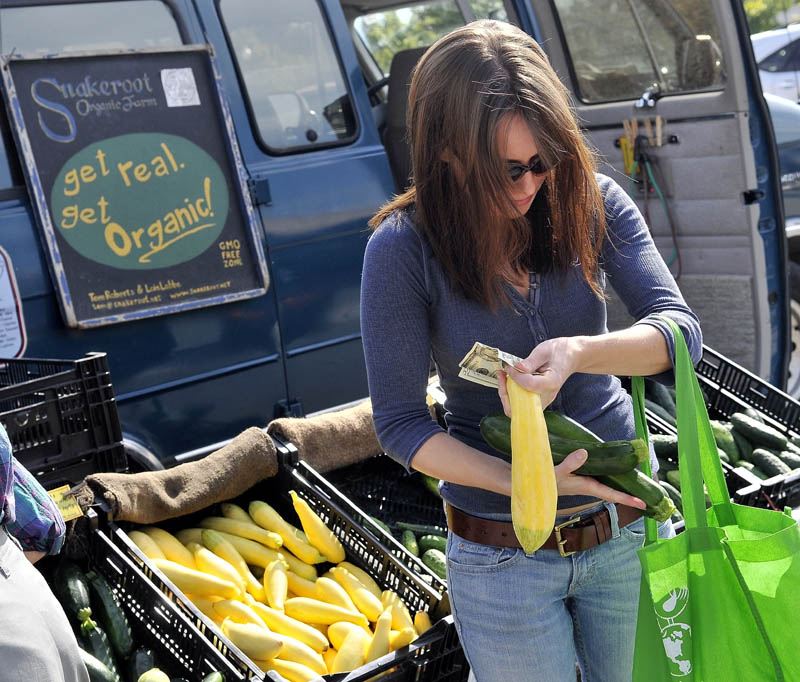A study released this week casts doubt on the idea that organic foods contain more nutrients than conventional foods, but at least some experts and shoppers say nutrition isn’t why they buy organic food.
Several Mainers said Wednesday that they grow and purchase food because they want to ingest fewer pesticides and they support the more environmentally sensitive practices of organic farming.
“I think there’s a lot of things that come into play besides the nutritional value,” said Dan Bourgeois, an employee of Snakeroot Organic Farm in Pittsfield.
In the study published in the Sept. 4 issue of Annals of Internal Medicine, a team led by two physicians at Stanford University examined previous studies comparing the nutritional quality of conventional and organic food. While the team found that organic food can reduce exposure to synthetic pesticides, it did not find statistically significant evidence that organic farming boosts the vitamin or nutrient content of produce.
The review of 237 research papers, including 17 studies and six random clinical trials, did find that organic milk may contain higher levels of beneficial omega-3 fatty acids, and that organic chicken and pork contained fewer antibiotic-resistant bacteria than conventionally raised products.
The study’s authors based their work on the premise that consumers choose organic food because they believe it is nutritionally superior to conventionally grown and raised food; yet Mainers who buy organic food and researchers who study organic farming say the study misses the mark.
“It’s a red herring,” said Molly Anderson, chair of Food and Sustainable Agriculture Systems at the College of the Atlantic in Bar Harbor. “It’s asking the wrong question.”
Anderson said, “The nutritional reasons are not the reasons why I think people are buying organic.”
Instead, she said, consumers are being driven toward organic by the issues of conventional farmers who routinely feed antibiotics to healthy animals and the use of synthetic pesticides and subsequent soil and water degradation.
Many public health experts have blamed the use of antibiotics in conventional farming for the rapid rise in antibiotic-resistant strains of deadly bacteria.
“(The researchers) were operating within that very narrow and nonsystemic viewpoint that a physician has, of what affects an individual consumer, and not what affects ecosystem health and the health of the population,” Anderson said. “To my mind, that’s not why we buy organic, to get a little extra vitamin C. We do buy it to get a little less pesticide residues and to support a healthy environment and the continued efficacy of antibiotics on which the population depends.”
The study’s findings don’t surprise Mary Ellen Camire, a professor in the department of food science and human nutrition at the University of Maine. She has conducted comparable trials on wild blueberries, with results similar to what the Stanford researchers found.
“We haven’t seen a lot of differences when we’ve looked at conventionally grown produce and organic produce,” Camire said.
Camire agreed with Anderson that superior nutrition isn’t the diving factor behind sales of organic food.
“It really comes down to do you want pesticides,” she said. “Organic practices are oftentimes better for the environment. It’s something that I think a growing number of consumers are thinking about.”
Her assessment was echoed by shoppers and farmers Thursday at the Downtown Waterville Farmers Market. Rachel Katz, owner of certified-organic Smith Farm in Troy said she was familiar with the study and disappointed by its scope.
“I think science often presents a reductionist view of the world and this is just one example,” she said of the study. “When we’re talking about food, we’re not just talking about nutritional value. We’re talking about the entire ecosystem in which that food was raised.
“Maybe an organic cucumber has the same measurable number of vitamins and nutrients as a conventional cucumber, but the soil that cucumber was grown in looks very different under a microscope, and the farm is a very different habitat.”
Fran Dubord of Waterville said she shops at the farmer’s market every week and the study will not change anything.
“It’s not going to sway me,” she said. “I’m not concerned about the nutritional value. I want to support the local farmers. “
David Gulak, manager of Barrel’s Community Market — a seller of all-local foods — is also familiar with the study. He wonders if the outcome of the study would have been different if the researchers focused on local foods versus all others.
“That’s probably a bigger variable than ‘organic or non-organic,'” he said.
Gulak contends that when growers let vegetables ripen on the vine and deliver them to market quickly, shoppers get better tasting food that also supports the local economy.
Karen Trenholm is owner of Wholesome Holmstead farm in Winthrop. The farm is not certified organic but follows organic practices, she said. Trenholm said consumers should take a simple approach to buying food.
“Know your farmers,” she said. “Find out what they do and practice. If you agree with it, then it’s a good source of food.”
Send questions/comments to the editors.




Success. Please wait for the page to reload. If the page does not reload within 5 seconds, please refresh the page.
Enter your email and password to access comments.
Hi, to comment on stories you must . This profile is in addition to your subscription and website login.
Already have a commenting profile? .
Invalid username/password.
Please check your email to confirm and complete your registration.
Only subscribers are eligible to post comments. Please subscribe or login first for digital access. Here’s why.
Use the form below to reset your password. When you've submitted your account email, we will send an email with a reset code.